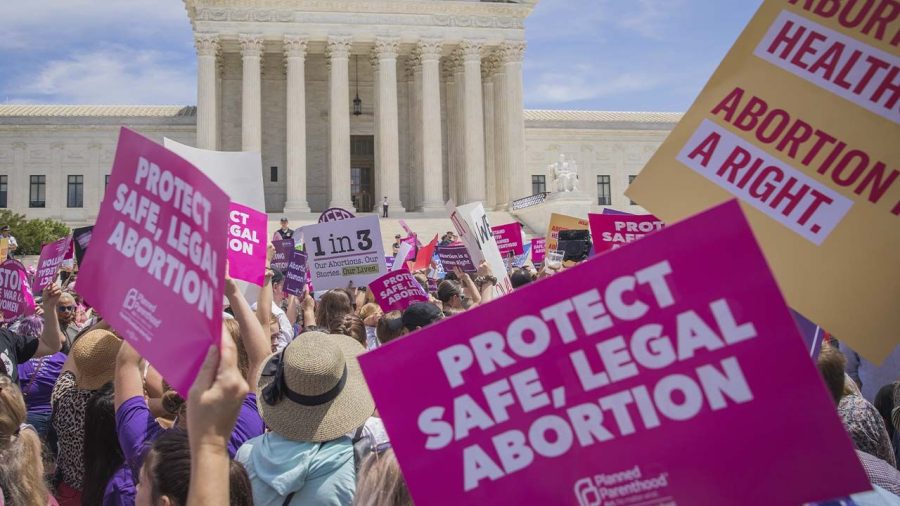Science is Not a Strong Suit of Anti-Abortion Laws
Pro-choice protestors at the Supreme Court in Washington D.C.
September 15, 2021
The Texas Heartbeat Act was signed into law by Governor Greg Abbott and put into effect on Sept. 1. This law includes one of the most extreme restrictions on abortions in the country, banning abortions after “detection of an unborn child’s heartbeat,” which occurs as early as six weeks, when many women are unaware of their pregnancy.
This legislation is especially disgusting because it makes no exceptions for incest or rape and marginalizes women of low socioeconomic status, who often can’t take work off to have access across state lines or can’t afford to raise a child.
But what particularly bothers me about this bill is the language used by these Texas Legislators. “Heartbeat” and “unborn child” are deliberate misnomers to evoke and play with people’s emotions. However, I’m not surprised, as science doesn’t appear to be a strong suit of many anti-abortion bills. At the six-week gestational period, this alleged “heartbeat” is nothing more than electrical pulses. There is neither a mature cardiovascular system nor a heart – only a rice grain-sized group of cells with electrical activity.
After Governor Abbott signed the bill into law, he said, “Our creator endowed us with the right to life and yet millions of children lose their right to life every year because of abortion. In Texas, we work to save those lives.”
I will never understand why anti-abortion lawmakers make it their end all be all to ban access to abortions if they apparently want to save lives. Banning abortion will never and has never stopped people from getting one. It only stops safe abortions. So yes, many women and their “unborn children” will die as a result of the limited access to this procedure.
According to the Center for American Progress, there is an inverse relationship between the number of abortion restrictions and both maternal and child health outcomes. Additionally, states with stricter abortion laws have higher rates of maternal and infant mortality rates. So, I wonder why there is so much effort being put into banning access to safe abortions when research clearly shows an increase in maternal and infant mortality rates.
If anti-choice lawmakers, such as Governor Abbott, want to reduce the number of abortions, where is the same push for increased access to contraceptives and sex education? The average cost of childbirth ranges across the country from $8,361-19,771, according to the Healthcare Cost Institute, so where is the same push for affordable healthcare or a national legal provision for paid maternity leave?
If these legislators really wanted to reduce unwanted pregnancies, they’d research and understand why women choose to have an abortion and then promote ways to reduce that number.
As women across the country worry about their reproductive rights being signed away with a paper and pen, anti-abortion organizations have celebrated it as a historic day.
“This is a massive victory for the pro-life movement and we are excited that the law can stay in effect,” said Rebecca Parma, senior legislative associate at Texas Right to Life.
I must bring up a final point directed at the entire pro-life movement, not just in regard to Parma’s statement. Using the term pro-life and not supporting access to contraceptives, sex education, affordable healthcare, more funding to foster care, a national legal provision for paid maternity leave, programs providing adequate means to raise a child or many other examples that put women in a position to continue a pregnancy, is not pro-life. I’m so sick of hearing anti-abortion rhetoric and watching people protest outside of abortion clinics.
There are more effective ways to reduce the number of abortions that don’t involve shaming or controlling women, many of which are provided by Planned Parenthood. This organization receives so much hatred from the pro-life community, yet it is doing more to prevent unwanted pregnancies and more for women in general than any anti-abortion laws.


